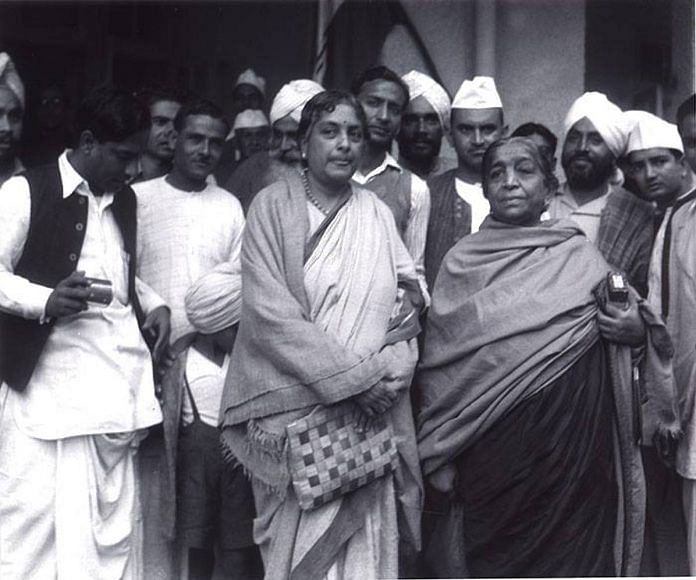Almost 120 years ago, India witnessed the birth of an extraordinary person who is difficult to describe within any particular social or political category despite leaving indelible imprints on both. Kamaladevi Chattopadhyay, a social reformer and political activist. Unfortunately, there is a lack of general information about her today, and very few archives could be used as a reference for a layperson interested in her life. But perhaps she was familiar with the fact that time spares nothing and nobody.
In her lifetime, she had seen the towering heritage of M.K. Gandhi crumble to a man whose life stood for antiquated idealism and occasional public holidays. Perhaps she would not have expected or wanted her legacy to survive. It is a testament to her life, however, that the institutions she established do indeed survive, including but not limited to the India International Centre, the National School of Drama, the All India Handicrafts Board, various crafts emporiums, and the very township of Faridabad. She had initially conceptualised Faridabad after Partition as a cooperative space for refugees to create new lives for themselves. True, today, these institutions are not exactly what she had envisioned them as, but they still preserve Indian art and culture, nurturing tradition within modernity to different degrees; they exist, to say the least.
Writing a fulfilling life
Although one has no option but to glean portions of Kamaladevi’s private life from other sources, her story, in her own words, comes through in the remarkable autobiography Inner Recesses, Outer Spaces: Memoirs. This is a book that is, in equal parts, a mix of many sub-genres. It is a recollection of a childhood steeped in cultural traditions of beauty and a keen political history told through an unsparing lens of India’s foremost freedom fighters. It includes portraits of contributors to India’s freedom struggle, both at home and abroad, like Pandita Ramabai, Abdul Gaffar Khan, Madame Bhikaji Cama. The book is also a vibrant travelogue of journeys through India, the Middle East, Africa, Europe, and America. It has dialogues with commoners, kings, begums, popes, artists, scientists, educationists, bandits, nomads, and policemen who tried to oust her from their respective lands, to which Kamaladevi sometimes responded by tearing the documents displayed for her arrest.
Throughout, her autobiography is a universal philosophical musing about the patterns of art and life itself — understanding essence (rasa) and then creating, from within the old, something entirely new. In a reflection of some of these interwoven themes, the title of the book seems to be drawn from a dialogue in Paris with photographer Henri Cartier Bresson, who had fatefully taken the very last pictures of Gandhi before his assassination, and it says, “Remember this world is as much inside the person as outside.”
Kamaladevi lived a fulfilling life throughout which she remained committed to the values of simplicity and labour, which had first drawn her into volunteering for the freedom movement. She occupied various key posts in her lifetime but was dismissive of ceremonial pomp-and-show, even government awards, as relics of the British Raj had no place in a free India. Queries about her refusal to take up offers of handling ministries or other high offices were met with a firm response — that she had no ‘real interest in politics’ and instead wanted to help Indians renew pride in their own cultural and artistic traditions.
She stood staunchly for the rights of equal citizenship, particularly for women, but disavowed the term ‘feminist’ as ‘narrow’ in its Western phraseology. In her autobiography, Kamaladevi says, “Obviously women were not the only victims of social and economic disabilities and discriminations…the women’s struggle had, therefore, to be an indivisible part of the larger political, social and economic struggle.” She was struck by the fact that home-science institutions, like Delhi’s Lady Irwin College, which she helped establish as part of her work at the All India Women’s Conference, need not be bound to a single gender.
Also read: Kamaladevi Chattopadhyay: The marvellous freedom fighter and feminist that India forgot about
Facing conflict
Being generally wary of all ‘isms’, she also did not actively proclaim herself as a Socialist despite an obvious inclination toward that ideological position. Two noteworthy episodes of conflict in Inner Recesses, Outer Spaces arise out of anger at Sardar Vallabhbhai Patel and Jawaharlal Nehru for their dismissal of that entire political faction as naïve, young, and unworthy of critical engagement. Both times, she made her displeasure clear to them without backing down in deference to either age or office.
Towards the former, she remained open to revising her opinion, especially in consideration of Gandhi himself. For the latter, she brought in a biting comment through her friend, the political cartoonist K. Shankar Pillai, who believed that the principle of maintaining a free world was to continue making fun of it. Kamaladevi mentioned, “Shankar’s Nehru was the most vivid characterisation I ever saw, as he drew a childish figure often looking rather lost to depict his prevarications and indecisive attitudes.” Hers seems to have been an innately sensitive and sympathetic personality, but one unwilling to bend on matters of principle.
Why is it important to remember Kamaladevi? Because she was a bastion of what independent India could have been and is still looking to become – sturdy in faith and conviction about the significance of one’s own civilisation, cosmopolitan, without any insecurities about its value when compared to other civilisations around the world. Time may, indeed, be inexorable, but, in Kamaladevi’s own words, “The past nestles in the present as the future burgeons forth from it.”
Yauvanika Chopra is currently the Associate Director of the New India Foundation. She tweets @YauvanikaChopra. Views are personal.
(Edited by Humra Laeeq)



